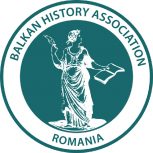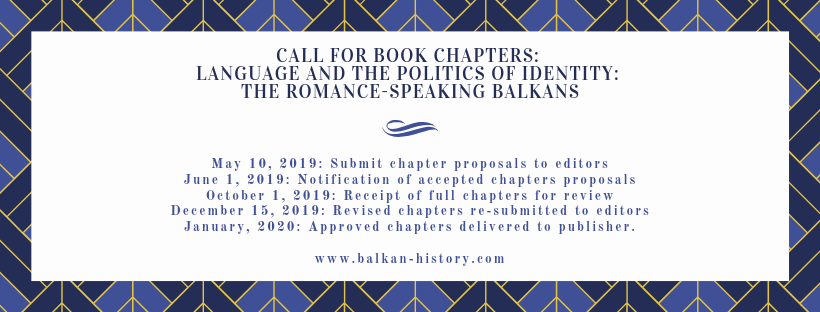Notification of accepted chapters proposals for the volume Language and the Politics of Identity. The Romance-Speaking Balkans.
Ana-Maria Lepăr (Faculty of History, University of Bucharest)
National identities and dressing code of the merchants from Bucharest in the first half of the 19th century.
Anna-Christine Weirich (Institute of Romance Languages and Literatures, Goethe University in Frankfurt)
The Italian-speaking Balkans (Italian in the Republic of Moldova: minority language, foreign language and language of migration).
Annemarie Sorescu-Marinković (Institute for Balkan Studies, Serbian Academy of Sciences and Arts) and Monica Huțanu (Faculty of Letters, History, and Theology, West University of Timisoara)
Creating and conveying identity online. The Vlach Romanians of Eastern Serbia.
Blagovest Njagulov (Institute for Historical Studies, Bulgarian Academy of Sciences)
Debatable Identities and Divergent Policies: The Romance-Speaking Communities in Bulgaria in the Context of Bulgarian-Romanian Relations.
Cătălin Mamali (University of Iowa)
Political terror and repressed cultural identity: ways to re-assert and develop ethnolinguistic identity.
Daniela Stoica (Faculty of Education and Philology, ‘ Fan S. Noli’ University of Korce)
Identity Constructions among the Members of the Aromanian Community from Korça Area, Albania.
Michael Studemund-Halévy (Center for the Study of Manuscript Cultures, University of Hamburg)
From From Rashi to Cyrillic. Bulgarian Judeo-Spanish (Judezmo) Texts in Cyrillic.
Ewa Nowicka (Institute of Sociology, Collegium Civitas, Warsaw)
Between Aromanian, Vlach and Local Identities. Eastern Romance Communities in Balkans
Synopsys
Language and the Politics of Identity: the Romance-Speaking Balkans is a project of the Balkan History Association which aims to investigate the complex relationship between language and identity of the Romance-speaking communities in the Balkans, as well as the cultural and political challenges they have been facing when trying to forge and express their identity over time. Starting from the observation that, among the many symbolic resources available for the cultural production of identity, language is the most flexible and in the same time, emblematic, the book looks into the Romance varieties spoken in the Balkans and the way they influence the identity of their speakers, regardless of how they are called (Romanians, Aromanians, Vlachs, Meglenoromanians, Bayash etc.).
Language is essential for the construction of socio-cultural and socio-political identities. This volume is meant to explore the character of individual and group identities as cultural and political constructions to which the Romance languages are a central element and to follow the ways in which the identity of these communities has been interpreted and performed in the Balkans.
In the twentieth century, the politics of identity has been manifested in different ways, from intellectual debates over the cultural representation of the territory to the utilization of institutional resources for the implementation of cultural policies. Thus, the performance of identity was often visible in the political arena. Many political parties, national movements and other organizations strive to enrich their projects with proposals on issues related to collective identification and loyalty to the national state.
Volume Editors
Annemarie Sorescu-Marinković (Institute for Balkan Studies, Serbian Academy of Sciences and Arts)
Mihai Dragnea (President of the Balkan History Association)
Thede Kahl (Professor for South Slavic Studies at the University Friedrich Schiller, Jena)
Blagovest Njagulov (Associate Professor at the Institute for Historical Studies, Bulgarian Academy of Sciences)
Donald L. Dyer (Professor of Modern Languages, University of Mississippi)
Angelo Costanzo (Associate Professor of Linguistics, Bloomsburg University of Pennsylvania)

